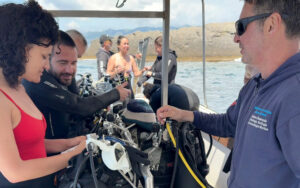Within its transfer programme, the MPA4Change project organised a practical training on climate change monitoring protocols to assess the impacts of global warming in Marine Protected Areas (MPAs). During the training, different experts in marine conservation gathered in Portofino MPA, Italy, in order to share their know-how with the participants.
Last week, the Portofino MPA hosted a practical training as part of the Interreg Euro-MED MPA4Change project. This face-to-face event engaged different experts in marine conservation with the objective build the capacity and knowledge of other Mediterranean MPA managers and related professionals in the implementation of validated toolkits in order to assess the impacts of climate change in the marine environment.
As part of the MPA4Change project team, nine trainers, including staff from Portofino MPA (Lorenzo Merotto and Valentina Cappanera), Brijuni National Park (Andrea Blaskovic), National Research Council of Italy (CNR-IRBIM;Ernesto Azzurro and Sara Bonanomi), Stazione Zoologica (Giulio Franzitta), The Marine Science Institute of the Spnaish Research Council (ICM-CSIC; Joaquim Garrabou and Marc Jou) and the French Research Institute for Exploitation of the Sea (IFREMER;Nathaniel Bensoussan) were engaged along with 6 participants of the training.
Training on Protocols to monitor climate change impacts
This practical training was carried out as part of the MPA4change Training on climate change adaptation in Marine Protected Areas, which is comprised of different toolkits that provide specific methodologies and protocols to develop climate change adaptation plans in MPAs.
Within the different parts of this training programme, the Hybrid Training on climate change monitoring protocols toolkit is composed by two parts. An online part for the acquirement of basic knowledge on the implementation of climate change monitoring protocols and the practical face-to-face worhsop organised in Portofino MPA, intended to consolidate the knowledge acquired online and that focused on the implementation of five different standardized climate change monitoring protocols:
- Fish Visual Census: snorkel and scuba-based transects were conducted to assess fish assemblages and gather key insights into species richness, abundance, and distribution in rocky benthic habitats.
- Assessment of mass mortality: participants learned to evaluate the condition and mortality of sensitive benthic species, such as gorgonians and sponges, that serve as indicators of environmental stress.
- Monitoring temperature conditions (simulation): participants practiced deploying underwater temperature data loggers, a key tool for tracking thermal anomalies and understanding their ecological consequences over time.
- Local Ecological Knowledge (LEK): the training emphasized the integration of local stakeholder knowledge—such as that from fishers and divers—to enrich scientific datasets with community-based observations.
- PowerBI: a practical session on Power BI, a monitoring tool adapted for visualizing and analysing the data collected from each protocol. Participants learned how to install the software, how to create a dashboard and upload the data.
The training also included a practical session on the utilisation of T-MedNet, a platform intended to develop a network to observe the effects of climate change on marine coastal ecosystems.
Other resources on climate change adaptation in MPAs
The participants of the practical training in Portofino were selected among a group of applicants that showed their interest in consolidating the knowledge on different climate change adaptation toolkits available online. They responded enthusiastically and considered the protocols as valuable toolkit to be tested.
If you want to follow their steps, get to know the learning opportunities that MPA4Change project provides to MPA managers and other marine conservation professionals. To start with, you can take a look to our Training programme wepage and register to our mailing list, through which you will receive updates on the opening or new toolkits and opportunities to participate to other practical workshops.



